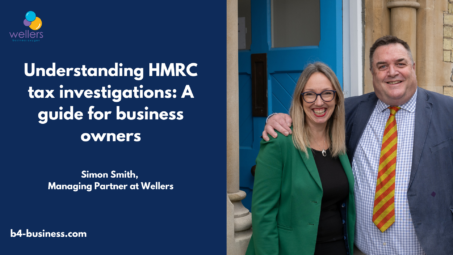
Protecting Business Ideas from Being Stolen
Wellers has helped countless entrepreneurs build and sell their businesses from its offices in Oxford, Banbury, Thame, and London.
Wellers has helped countless entrepreneurs build and sell their businesses from its offices in Oxford, Banbury, Thame, and London. Here, one of its partners, Stuart Crook, shares his advice on keeping business ideas safe from ‘thieves’ and details why it is always better to be proactive and plan ahead.
In a world of connectivity when everyone seemingly has an online presence, it is no surprise that ideas often get stolen, even by accident – after all, few ideas are truly new ones. That doesn’t mean that businesses should accept that innovative ideas are destined to be poached by someone else. To avoid this, it is important that steps are taken to protect business ideas and product concepts. However, if an idea is stolen, there are actions that need be taken to rectify the situation and ensure it doesn’t happen again.
Prevention not Cure
It is much easier to protect an idea by securing the thinking before it can be stolen. Playing catch up after the event is much harder than setting plans in motion when things are operating smoothly.
Patents are the best way to ensure that ideas aren’t pilfered, however they are expensive to acquire, and the process can take years. If patents aren’t the best route, the good news is there are still other options.
Non-compete Agreement (NCA)
Usually part of an employment contract, a non-compete clause prevents former employees from starting in a similar profession or trade that might rival or hamper the original employer. Sometimes this is for a set duration, or it can be open-ended.
Non-disclosure Agreement (NDA)
NDAs can be used for an array of different purposes. Usually they are signed by a third party working with an organisation, whether that’s an external marketing agency, packaging business, or graphic designers. It means that they are bound by confidentiality and restricted from talking, in this case, about the idea with anyone else externally. It is wise to be wary of an expiry date, similar to a non-compete clause, as not setting one may be preferable.
Work-for-hire Agreement
If a business has many people working on an idea or concept, particularly if they are contributing on a freelance basis, it must make sure to have it in writing that any and all improvements are their property. This ensures that any advancements are owned by the business rather than an external advisor.
My Idea was Stolen – What do I do now?
We have already discussed why prevention is better than cure, but it doesn’t always happen that way and sometimes the safety nets are forgotten because the pursuit of making the idea a reality is the sole focus. This opens up the opportunity for the idea to be stolen in the process, but that doesn’t spell the end of the business and there are some key things to remember here.
Do not confront the person or people involved. Like with anything that can go wrong in life, it is better to wait a couple of hours, or even a few days, before responding. This ensures a level head is engaged so that the situation can be resolved in a constructive manner that will likely yield a more positive result. After waiting a few hours, contact the person to discuss the issue directly.
It is at this point where it may be discovered that it was unintentional and a misunderstanding, in which case the matter can be rectified quickly and without further upset. If not, then the situation may require legal action to be resolved. If this route is necessary, it needs to be acknowledged that getting lawyers involved is not only a costly exercise, but it is also a big distraction for business owners as it will soak up their precious time, energy, and attention. Therefore, settling things without the need of a solicitor is usually the preferred method.
Once a dispute has been settled, there are three important things to consider that will ensure the same thing doesn’t happen again – learn from the experience, keep your idea, and move on.
Learn from it
Now is the time to put plans in place to prevent ideas being stolen in the future. Although it is exciting to develop new processes and concepts, and it is easy to share the excitement with others, sometimes it is better to keep your cards close to your chest – or only share them with those you implicitly trust.
Keep Going
Don’t let one knock-down prevent further business ideas from manifesting. It can be a frustrating and disheartening process having an idea stolen, but that doesn’t mean it should stop you in your tracks. The only thing that was stolen was the idea itself, not the strategy behind it or the way the concept was going to be brought to market.
Move On
The final option is just to leave it. If the process has left you feeling uninspired about the idea or less passionate about your initial vision, you can just walk away. You can start a new project or find a different market to operate within.
Conclusion
Having a business idea stolen is unethical and underhand, but it can also leave you feeling deflated. However, it does mean that somebody thought your idea was so good that they had to take it for themselves. The key is to prevent ideas from being stolen before they enter any public domain or forum. That’s why there are laws in place to protect businesses and entrepreneurs. If the worst does happen though, it is important to remember that there is still a way forward and it doesn’t have to spell the end of your vision.
For more information and insight into how to asses and implement your business idea visit the Wellers website.
More in Accountants

Why having an audit can boost your business
Many directors will wince at the prospect of an audit, seeing it as a necessary evil to meet statutory obligations.

FRC Proposes Major Overhaul of Auditing Standards
In a bold move, the Financial Reporting Council (FRC) has unveiled proposed changes to auditing standards that could have a major impact on the financial world, according to chartered accountants and business advisors Whitley Stimpson.

Whitley Stimpson shines as finalist for top national award
Service Charge Accountancy specialist Jonathan Walton of Whitley Stimpson has been recognised for his outstanding work in the field by being shortlisted for a prestigious property industry award.
From this author

Budget 2024 review: A bitter pill for SMEs?
Tom Biggs, Partner at Wellers, the Oxford-based small business accountants, discusses the latest Budget and the impact it will have on SMEs.

Understanding HMRC tax investigations: A guide for business owners
Simon Smith, Managing Partner at Wellers, discusses what business owners need to know about tax investigations, including whether you could be a target.

Evolution and Growth for Oxfordshire’s Wellers
Simon Smith takes the helm as Managing Partner

